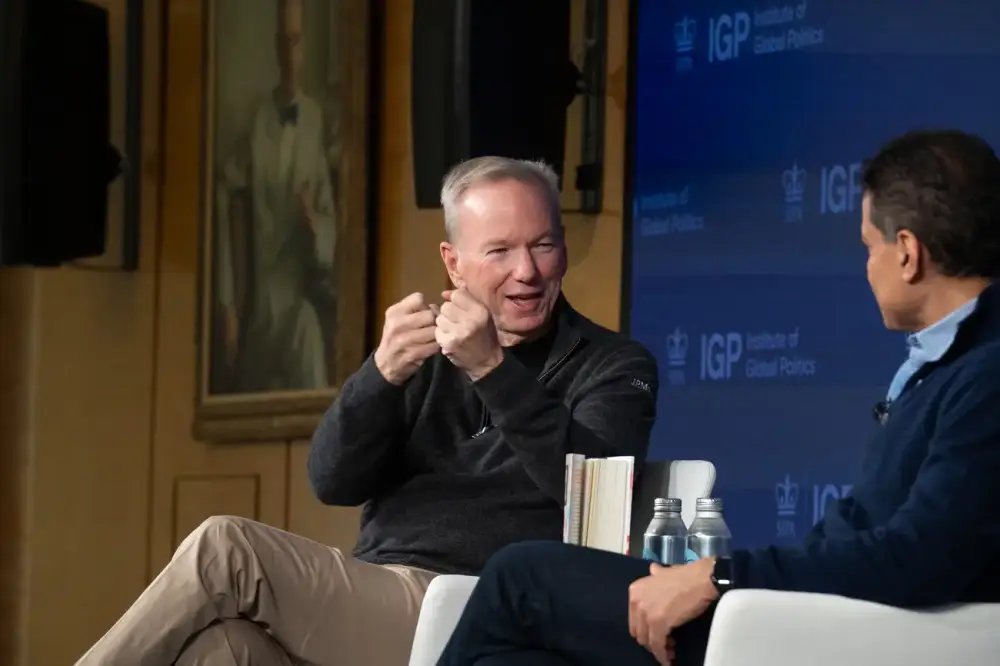
Cựu CEO Google Eric Schmidt bác bỏ lo ngại AI là bong bóng
-
Cựu CEO Google Eric Schmidt khẳng định tại hội nghị RAISE ở Paris rằng ông không tin ngành AI là một bong bóng, mà là một "cấu trúc công nghiệp hoàn toàn mới".
-
Schmidt thừa nhận rằng một số tuyên bố từ các giám đốc AI nghe rất giống với những dấu hiệu bong bóng cổ điển, đặc biệt là về việc xây dựng hạ tầng quá mức và nguy cơ dư thừa công suất trong 2-3 năm tới.
-
Tuy nhiên, ông không cho rằng tình hình sẽ giống như bong bóng dot-com từng sụp đổ khi ông tiếp quản Google.
-
Schmidt đưa ra ví dụ về thị trường phần cứng, cụ thể là chip, như một chỉ báo rõ ràng về sự bền vững lâu dài của AI. "Tôi chưa từng thấy phần cứng nào không được phần mềm tận dụng", ông nói.
-
Đặc biệt, ông đề cập đến các trung tâm dữ liệu lớn và nhu cầu chip khổng lồ đang được đáp ứng bởi các công ty như Nvidia – vốn hưởng lợi nhờ AI phát triển mạnh.
-
Dù ông không chọn phe – giữa những người cho rằng AI đang bị thổi phồng và những người tin rằng AI đang bị đánh giá thấp – Schmidt tin rằng đây là một quá trình chuyển đổi công nghiệp thật sự.
-
Ngành AI, vốn đạt giá trị thị trường 189 tỷ USD vào năm 2023, được dự báo sẽ tăng lên 4.800 tỷ USD vào năm 2033 – mức tăng hơn 25 lần trong một thập kỷ.
-
Trái ngược với Schmidt, một số chuyên gia Phố Wall như Torsten Sløk (Apollo Global Management) cảnh báo bong bóng AI còn lớn hơn cả thời kỳ dot-com, do định giá các công ty hàng đầu S&P 500 hiện vượt xa so với những năm 1990.
-
Sløk cho rằng các công ty AI hàng đầu hiện đang bị định giá quá mức, là yếu tố chính gây nên rủi ro bong bóng trên thị trường tài chính hiện nay.
📌 AI không đơn thuần là một xu hướng tạm thời mà đang tạo ra một cấu trúc công nghiệp mới, theo Eric Schmidt. Sự phát triển mạnh của thị trường chip, nhu cầu xây dựng trung tâm dữ liệu và sự đầu tư mạnh từ Big Tech là minh chứng rõ ràng. Dù có ý kiến trái chiều từ giới tài chính, đặc biệt từ Phố Wall, các dự báo tăng trưởng lên tới 4.800 tỷ USD vào năm 2033 cho thấy tiềm năng to lớn.
https://www.businessinsider.com/eric-schmidt-ai-market-not-bubble-2025-7
Eric Schmidt explains why he doesn't think AI is a bubble — even if it might look like it
By Henry Chandonnet
Eric Schmidt is pictured.
Former Google CEO Eric Schmidt said he doesn't believe AI is a bubble. He thinks of it as a "whole new industrial structure." Shahar Azran/Getty Images
Jul 20, 2025, 4:01 PM UTC
Former Google CEO Eric Schmidt doesn't think the AI industry is a bubble. He thinks of it as a "whole new industrial structure."
At the RAISE Summit in Paris, Schmidt acknowledged that much of what he hears from AI executives is "classic bubble."
Looking at the chip market, Schmidt said he sees reason for confidence in AI's continued expansion.
Eric Schmidt took over as Google's CEO in the midst of the dot-com bubble burst. He doesn't anticipate the same fate for AI.
The former Google executive explained why he didn't think the AI industry was in a bubble while speaking at the RAISE Summit in Paris.
AI has expanded rapidly in the years since ChatGPT took off and Big Tech invested heavily in the industry and ignited a new talent war. With an estimated market value of $189 billion in 2023, it's projected to grow into a $4.8 trillion industry by 2033.
While some may see signs of an eventual crash, Schmidt — who has investments in multiple AI companies, including Anthropic — pointed to hardware and the chips market as a specific sign that the market has longevity.
"You have these massive data centers, and Nvidia is quite happy to sell them all the chips," Schmidt said. "I've never seen a situation where hardware capacity was not taken up by software."
Schmidt, speaking about his conversations with AI executives, said that he's heard talk that the AI industry is in a "period of overbuilding," and that they'll hit "overcapacity in two or three years."
"They'll say, 'But I'll be fine and the other guys are going to lose all their money,'" Schmidt said. "That's a classic bubble, right?"
Then there's the other side of the debate, the Bay Area techies who think that reinforcement learning chains will transform the world. "If you believe that those are going to be the defining aspects of humanity, then it's under-hyped and we need even more," he said.
Schmidt didn't side with either side — overcapacity or under-expansion — but he did weigh in on whether it was an industry facing a bubble-level correction.
"I think it's it's unlikely, based on my experience, that this is a bubble," Schmidt said. "It's much more likely that you're seeing an whole new industrial structure."
Not everyone agrees. On Wall Street, talk of a potential bubble continues to simmer.
On Wednesday, Apollo Global Management's chief economist Torsten Sløk said that the stock market faces an even bigger bubble than the dot-com boom. The primary culprit, in his view: AI.
"The difference between the IT bubble in the 1990s and the AI bubble today is that the top 10 companies in the S&P 500 today are more overvalued than they were in the 1990s," Sløk wrote.
Thảo luận
Follow Us
Tin phổ biến



